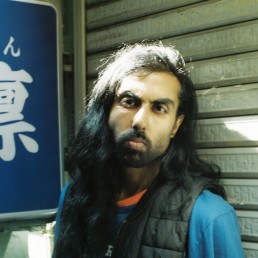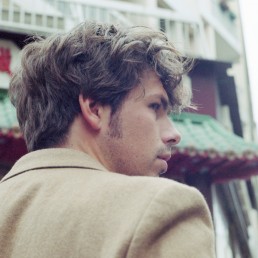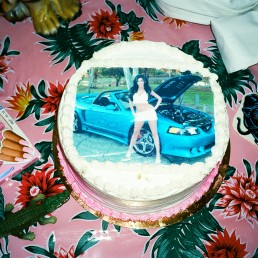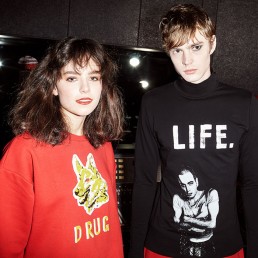Back in 2013, the case of Chelsea Manning shocked the international community, and in light of the status quo, her fight seems to be far from finished. The new movie XY Chelsea directed by Tim Travers Hawkins takes the viewer on a breath-taking trip to understand one of the most rebellious and fearless activists of our time. The score of this peculiar documentary was composed by Jehnny Beth (Savages) and Johnny Hostile, this conversation explores their creative process and why this documentary is so essential within the current socio-political context.

I must say that it’s my very first time interviewing film score composers… I watched XY Chelsea and it’s very impressive, to say the least, so first things first, I’d like to understand how this whole project came together for you guys?
Johnny Hostile: Actually, it’s our first time scoring a whole movie.
Jehnny Beth: It was Tim Hawkins, the director, who contacted us. He was in the final stage of the production, and he asked us if we wanted to compose the score.
Was he familiar with your work?
JH: Tim loves Savages and I think that’s the vibe he wanted initially. But when it comes to creating music, you have to go for instrumental compositions, and the process differs from the way you work in a band.
JB: For me, it made total sense to compose the score with Johnny, because he has such fluidity with creating these different atmospheres. I just knew it’d gonna be easy to work together, talk about different moods and he creates music so quickly, it’s almost disgusting.
Johnny, you’ve touched an important point when you said that scoring a movie differs drastically from working on personal projects. Could you guys elaborate on the creative process scoring XY Chelsea?
JH: I mean it’s music, right? It has been my job for 20 years now and I developed certain automatisms… I go to the studio, write some music and it can work for anything, that’s how I see it. Even when I produce music for other artists, I always start with a mood, a very cinematic, drone ambience and I take it from there. I can do hours and hours of instrumental music, very easily, because that’s how I trained myself.
JB: He’s a really impressive and prolific writer.
In terms of influences, I’ve noticed some Sunn O))) vibes here and there, Alva Noto, Sakamoto, Frahm…
JH: A lot of good names in there, Sakamoto is actually one of my heroes. He’s up there with Morricone and all those legends. Eric Sati is also a huge influence, he’s an absolute genius of minimalism. I also like Alva Noto a lot, we met him right Jehnny?
JB: Yes, him and Nils Frahm as well, they’re really great composers.
Did you guys hear about Funkhaus? It’s a huge GDR studio complex where Nils recorded his latest album?
JB: Yeah, Nils told us about it, we were supposed to go there to record a radio episode and talk…
JH: In the end, we didn’t have the chance to go, unfortunately, but projects like the Funkhaus revival are very important.
Johnny what about yourself, do you work a lot with analogue instruments?
JH: To be honest, I have no rules. I can spend hours and hours creating music on my computer or playing around with my synth. It’s always about the sound I need, I don’t care if I achieve it via analogue or digital instruments. But I do respect analogue freaks like Johnny Jewel and he’s sound is just so perfect, it’s pure analogue, but you can’t really tell whether it’s digital or analogue, it’s fascinating.
JB: It’s like a rule, he’s obsessed with his gear.
Johnny Jewel’s sound is unique in fact… Sorry guys, I’ve deviated myself from our main topic. I really enjoyed how you guys placed the track She Will, it worked out so well, one of the strongest moments in the movie in my opinion.
JB: It was Tim’s idea from the very beginning to place She Will on that scene.
She Will was released back in 2013. Around the same time, Chelsea Manning’s story blew up, was the song inspired by her by any chance?
JB: No, it was inspired by a friend of mine, she has an extremely beautiful life force.
There’s this very touching scene in the movie when Chelsea describes sounds in her life. The sound of leaves, the sound of the river, and the breeze she could hear while behind the bars did that moment inspire you somehow?
JH: It’s so funny, that was one of my favourite moments… I think it’s so essential to have that kind of sounds in your life. So, when I heard her talking about them, I understood that I already had some eerie compositions that could evoke you know… the sound of a stream for example.

JB: It was really interesting listening to her comparing the perception of these sounds in prison and after being released.
JH: When she said that it reminded me being in the classroom, bored as fuck, and looking at trees out there, asking myself ‘’What the fuck am I doing here?’’.
I think most of us can relate to that… it’s quite an accurate analogy. How did you guys feel after watching the movie? I suppose you’ve seen it without any score in the first place?
JH: It wasn’t the same editing, but very similar.
JB: We felt it was a good movie, it was a very unexpected movie on such a historical figure as Chelsea, because it approached her in a way that no one did before. Show her as a human being, exposing the struggles she is going through, it’s really like a portrait film, and this approach inspired us a lot while we were writing the score. The scene that inspired us the most was the moment when she boards the plane after being released from prison.
JH: That was the money shot.
JB: Even without music, that scene was very moving. It was the starting point for us, really.
JH: When we watched that scene, the team explained to us how they did it, there was no time to rehearse that scene, you know because it was a one time happening. Tim needed prior planning of what he wanted to shot, like filming Chelsea walking out of the prison for example. He had to move backwards and you can see how the image is trembling.
JB: Initially Tim was not even supposed to be there. Chelsea was not supposed to be released, and he was making a documentary about Chelsea being in prison.
Right, Obama commuted her sentence.
JB: Yeah, and then Tim understands that she might be released. When the word gets around, he’s trying to be there for the phone call. It’s the scene in the very beginning of the movie, so Tim needs to travel between places to catch that moment on camera. Then he calls the production saying that she’s been released, and he needs to start filming the movie all over again. Tim’s eagerness is amazing, he wanted to be there upon her release, it was just him and his camera.
When confronted about her actions by Lisa Rein at the beginning of the movie, Chelsea hesitates, saying that she doesn’t know if it was all worth it. Later in the movie, her opinion weighs into a more positive direction.
JB: Chelsea is such a mysterious character, she acts, but she doesn’t necessarily give you a very developed answer why she does it. She acts on her instinct, that’s why it’s so thrilling to watch her on camera because she’s so unpredictable, she’s always moving and evolving.
JH: And the fact that she doesn’t have a precise answer means that she’s acting without thinking too much. She does it because her gut feeling says it’s the right thing to do, but then the consequences are so brutal that she can’t really reason about it. Her actions are good for the well-being of others, but not for her own well-being.
JB: Actions are so much more powerful than words.
JH: She made Wikileaks famous, it’s because of the files she exposed that Wikileaks became so enormous. Transparency means struggle.
“Her actions are good for the
well-being of others,
but not for her own well-being.”
– Johnny Hostile

XY Chelsea is now available via YouTube and Google Play.
Listen to the OST here.
Watch the trailer below:





